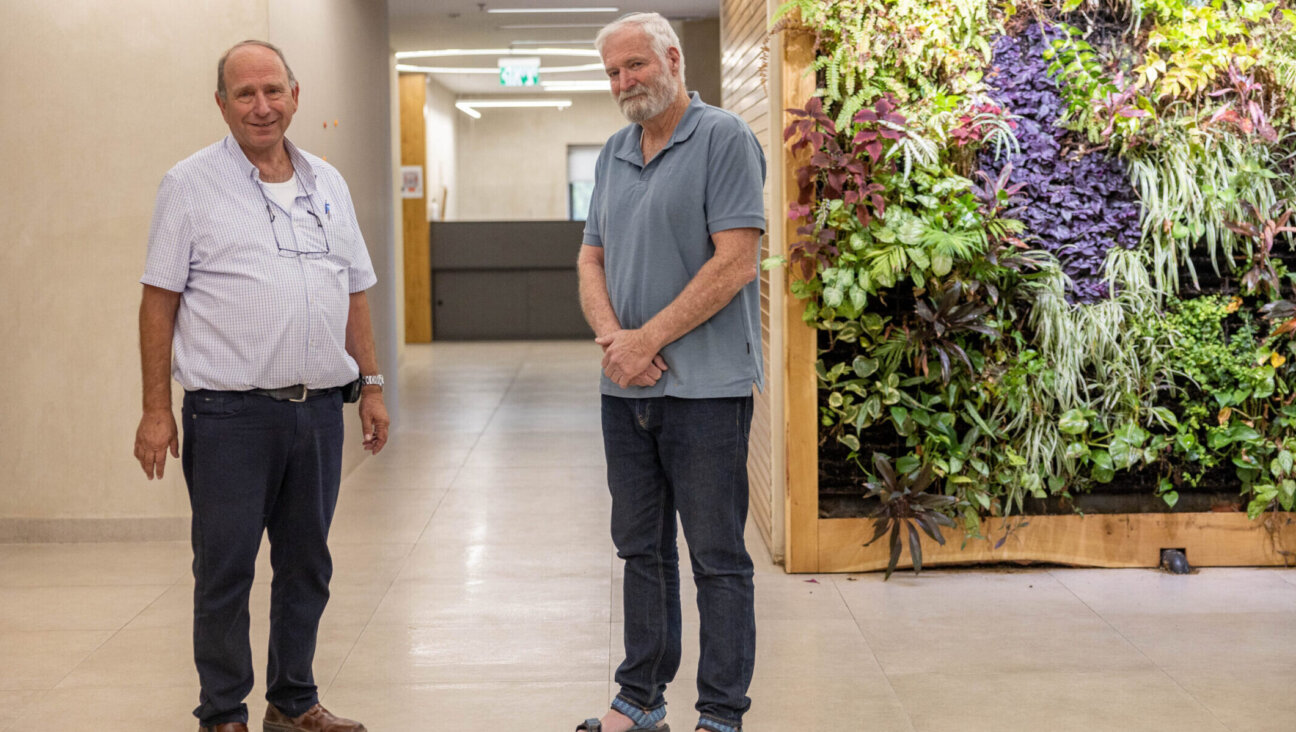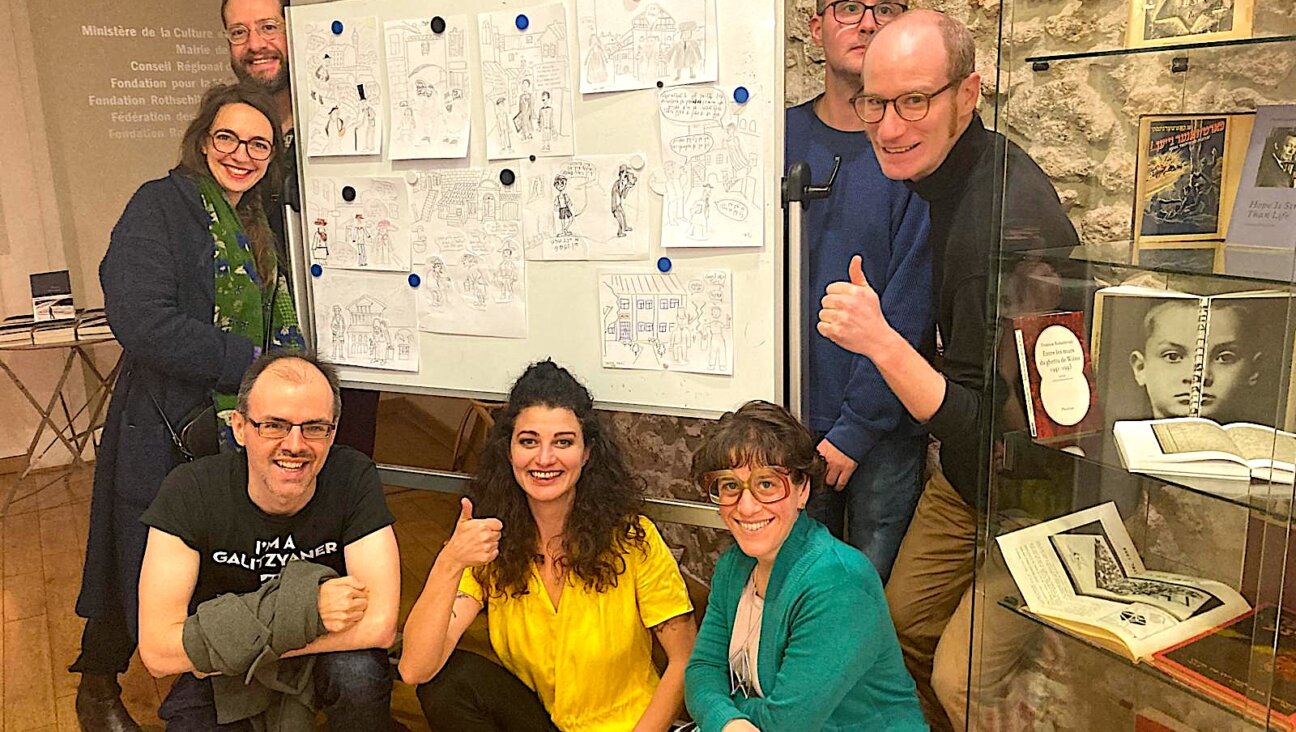Churchill: Good For The Jews?
KISSINGER LAUDS THE BRITISH AT ENGLISH BALL OF THE ROSES IN NEW YORK
“In 1946 I vas a sniper viz ze Haganah and shooting at you British, but now it’s okay,” said sexpert Ruth Westheimer to a medal-adorned guest during the reception at the April 25 St. George’s Society of New York’s English Ball of the Roses. Later she confided: “You know vy I vas not at Rabbi Arthur Schneier’s reception for the pope? Because some journalists vould see me and the pope talking and vould vonder vat kind of advice vas I giving him! Neither he nor I needs that kind of publicity!” Addressing the elegant crowd in the Rainbow Room, guest speaker Henry Kissinger mused: “I’ve become so old, I’ve known eight British prime ministers but only one British queen. At the end of World War II, [Britain] would link its destiny explicitly with the United States.” Apropos more recent events, Kissinger added: “The French deal with us by telling us we’re not very bright. The British embarrass us when we don’t get it right… [but] they are the only ally that stayed with us.”
“I have a friend who is of the view that there is no such thing as a British accent, that they put it on to put us in our place,” Kissinger joshed before placing the St. George’s medal around the neck of honoree Martin Sullivan, president and CEO of American International Group, Inc. Kissinger said: “Martin took over a huge organization in crisis… led to the globalization of his industry.… When a series of new crises challenged him, he said the only plague that hasn’t hit him yet is a plague of locusts.” Sullivan, with whom I have chatted at a number of New York Jewish events, thanked “my wife Antoinette.” He saluted the “116,000 colleagues around the world,” and thanked Kissinger “for being here,” adding that “at 4 p.m. this afternoon, [Henry] was entertaining the president of the United States and 400 guests at his home in Connecticut.”
Yorkshire-born novelist Barbara Taylor Bradford, recipient of the St. George’s Medal for Excellence in the Arts, basked in the glory of being “the first woman honored [in 238 years] by this male bastion of chauvinistic power.” (Founded in 1770, six years before the Declaration of Independence, St. George’s Society of New York is America’s first social services organization.) Author of 23 novels totaling 81 million volumes, which have been translated into 40 languages and sold in 90 countries, Bradford described her first meeting with Queen Elizabeth II: “The queen was smiling and cuddly. She said she heard that I wrote about history.” Bradford also wondered about the queen, “Was she aware that I wrote about her ancestors who were killing each other off?” After a pause, Bradford mused: “That has the beginning of a novel.”
WAS CHURCHILL GOOD FOR THE JEWS? A YIVO-SPONSORED “CONVERSATION”
Was he good for the Jews? Was he good for the Zionists?” So posited historian and foreign policy expert Michael Makovsky, author of the 2007 account “Churchill’s Promised land: Zionism and Statecraft,” at the recent Yivo Institute for Jewish research-sponsored event “Churchill and Zionism: Not by Sufferance but by Right,” which had Makovsky in a conversation with Sir Harold Evans. Noting the approach of Israel’s 60th anniversary “at a time of rising anti-Zionism, resurgent antisemitism and wildly exaggerated perception of Jewish power in the world,” Makovsky prefaced the heavy-duty “conversation” with such tidbits as “Churchill’s father [Sir Randolph Churchill] loved Jewish food; Queen Victoria liked [Benjamin] Disraeli but did not like the Jews,” and “Churchill was guided by an adage he ascribed to Disraeli: ‘The Lord deals with the nations as the nations deal with the Jews.’” During the “conversation,” legendary publisher and editor Evans noted that Winston Churchill “equated Zionism as a civilizing influence akin to what the English [brought] to India.” Makovsky presents Churchill as one who “came to see Zionism as a cause that restored dispersed, persecuted Jews to their historic homeland, where they could observe their traditions and civilize an area left barren by what he perceived as backward, anti-British Arabs.” He further noted that Churchill “was indeed good for the Jews and Zionism, despite some glaring shortcomings at pivotal points.… He eventually concluded that Zionism and then Israel righted a historical wrong, addressed humanitarian demands, advanced Western civilization, and contributed to British and Western security.”
The triangular “conversation” that included Makovsky, Evans and Martin Peretz, editor in chief of The New Republic and chairman of YIVO Board of Overseers, stimulated many questions from that evening’s historically knowledgeable audience. Ordinarily I scan promotional book blurbs, preferring to let the author be the primary messenger. But because of the coincidence of the current release of a new documentary film, “Refuseniks” — which highlights the Soviet Jews’ struggle to leave the USSR for Israel — Natan Sharansky’s comments about Makovsky’s revelation about Churchill resonate with eerie immediacy: “Today, when Western civilization is under severe attack and the legitimacy of national movements, such as Zionism, is being challenged by the new post-nationalist universalists, Michael Makovsky shows in dramatic and vivid detail why Churchill, one of the greatest statesmen in centuries, consistently and stubbornly fought for both.”
“REFUSENIK” — A MUST-SEE DOCUMENTARY ABOUT THE RESCUE OF SOVIET JEWRY
For those who witnessed or participated in the 1960s-1980s struggle for Soviet Jewry, Laura Bialis’s documentary, “Refusenik,” is a reminder of a desperate yet magical time in the activism of American Jews that was sparked by “students and housewives” as protesters of that time were derogatorily labeled. For younger viewers it is an archival journey into an era when conviction and heroism trumped terror and oppression. Bialis captures the day-by-day terror experienced by Jews in the USSR — many of whom knew little about being Jewish — yet hungered to live as Jews and leave the Soviet paradise only to find themselves hermetically imprisoned. Stalin’s destruction of Jewish cultural life, the murder of Jewish artists and writers, and the panic of finding oneself without job, money or identity is all showcased as Bialis follows the trajectory of several refuseniks. But center stage is Natan Sharansky and his young wife, Avital. The unrelenting, impassioned effort of Avital to free her husband helped galvanize world opinion and pressure.
“Refusenik” follows the evolution of Student Struggle for Soviet Jewry as it impacted the nation’s and world’s Jewry to demand, “Let my people go.” A reminder of a time OF reciprocal dialogue is shown with A now forgotten rally, at which Bayard Rustin told a crowd: “There was not a single [time] when the negroes had their backs to the wall, that our Jewish brothers did not come to their assistance.… We must not be silent.” A very young and very lean Elie Wiesel, author of “The Jews of Silence,” speaks at a rally, as do (then younger) Kissinger, Bella Abzug, Golda Meir, Jacob Javits, Malcolm Hoenlein, Alan Dershowitz, Jimmy Carter and Elizabeth Holtzman. You just want to hug Rep. Henry “Scoop” Jackson as he rails against the Soviet Union, demanding it release its Jews so that they can go to Israel. And then, in 1989, the wall came tumbling down and Soviet Jews could finally leave at will! “Refusenik” brought back painful memories. In 1940 in Vilna, the KGB predecessor, the NKVD, arrested my father, an activist. He was sent to Siberia and spent time in solitary confinement. Though he was released in 1945, I did not see him face to face until he came to New York in 1959. He never spoke of his torture in prison. Were it not for Menachem Begin’s book “White Nights,” in which Begin describes how he and my father — with whom he shared a cell — organized a hunger strike, I would have known nothing of his travails. And thanks to Sharansky’s book “Fear No Evil,” I got an inkling of what my father — who twice almost died in prison — had experienced.
I met Sharansky in June 1988 in Anaheim, Calif., at a lavish, champagne-flowing reception hosted by his then publisher, Random House. Among the publishing company guests were chairman Robert Bernstein, trade division head Joni Evans (former wife of Harold Evans), David Brinkley of ABC News and Peter Osnos, who had been a Moscow correspondent for The Washington Post. Sharansky was gracious. He shook hands, smiled and no doubt wanted to be back home in Israel with Avital, who was awaiting the birth of the couple’s second child. Arrangements were made for me to interview Sharansky back in New York.
Mine was the third interview that day, with a limit of 45 minutes. Sharansky told me, “My parents named me Anatoly instead of Natan not to irritate people around me with a too Jewish name.” He had told he was unfamiliar with the Forward, so I brought several copies, including one with his photo on the cover. When I told him of my father’s arrest, he relaxed and we cut to the chase. The interview ran for more than an hour and appeared in the June 17, 1988, issue of the Forward. What still resonates is Sharansky’s answer to my question: “What remarkable inner strength enabled you to fight off the KGB… kept you from allowing them to become “human”… because once ‘humanized’ you said you felt you would lose your resolve?” Sharansky replied, “I think that as long as you know why you are there, what you are struggling for, what your moral principles are, as long as you feel strongly the difference between that life and where they want to push you, that life which you had before as a slave, and the life you now have as a free man, as long as you know the moral principles you are standing on, you have enough resources to keep yourself in contact with everything that is dear to you — with your country, with your people, with your wife.”
He autographed my copy of his book, “Fear No Evil,” as follows: “To Masha — To Jew with Russian name from Jew who had Russian name. You are the first reporter who asked me original questions. Thank you and all the best. Sincerely, Natan Sharansky” We have since met and spoken at many New York events.
A message from our CEO & publisher Rachel Fishman Feddersen

I hope you appreciated this article. Before you go, I’d like to ask you to please support the Forward’s award-winning, nonprofit journalism during this critical time.
We’ve set a goal to raise $260,000 by December 31. That’s an ambitious goal, but one that will give us the resources we need to invest in the high quality news, opinion, analysis and cultural coverage that isn’t available anywhere else.
If you feel inspired to make an impact, now is the time to give something back. Join us as a member at your most generous level.
— Rachel Fishman Feddersen, Publisher and CEO






















